Therapeutic Communication Skills: Improving Dementia Patient Care
VerifiedAdded on 2023/04/21
|14
|4376
|284
Essay
AI Summary
This essay discusses the application of therapeutic communication skills in nursing practice, specifically in the context of caring for a 70-year-old patient, Mr. XYZ, suffering from early-stage dementia and chronic osteoarthritis. The essay highlights the importance of fundamental nursing principles, NMC codes of practice, and the Department of Health guidelines in providing patient-centered care. It emphasizes the development of a therapeutic relationship through five key components: trust, respect, professional intimacy, empathy, and power. The essay illustrates how these components were integrated into the care plan for Mr. XYZ to improve his quality of life, self-esteem, and overall well-being, ultimately helping him overcome feelings of burden and social withdrawal. The importance of effective verbal and non-verbal communication, cultural sensitivity, and ethical considerations in dementia care are also underscored.
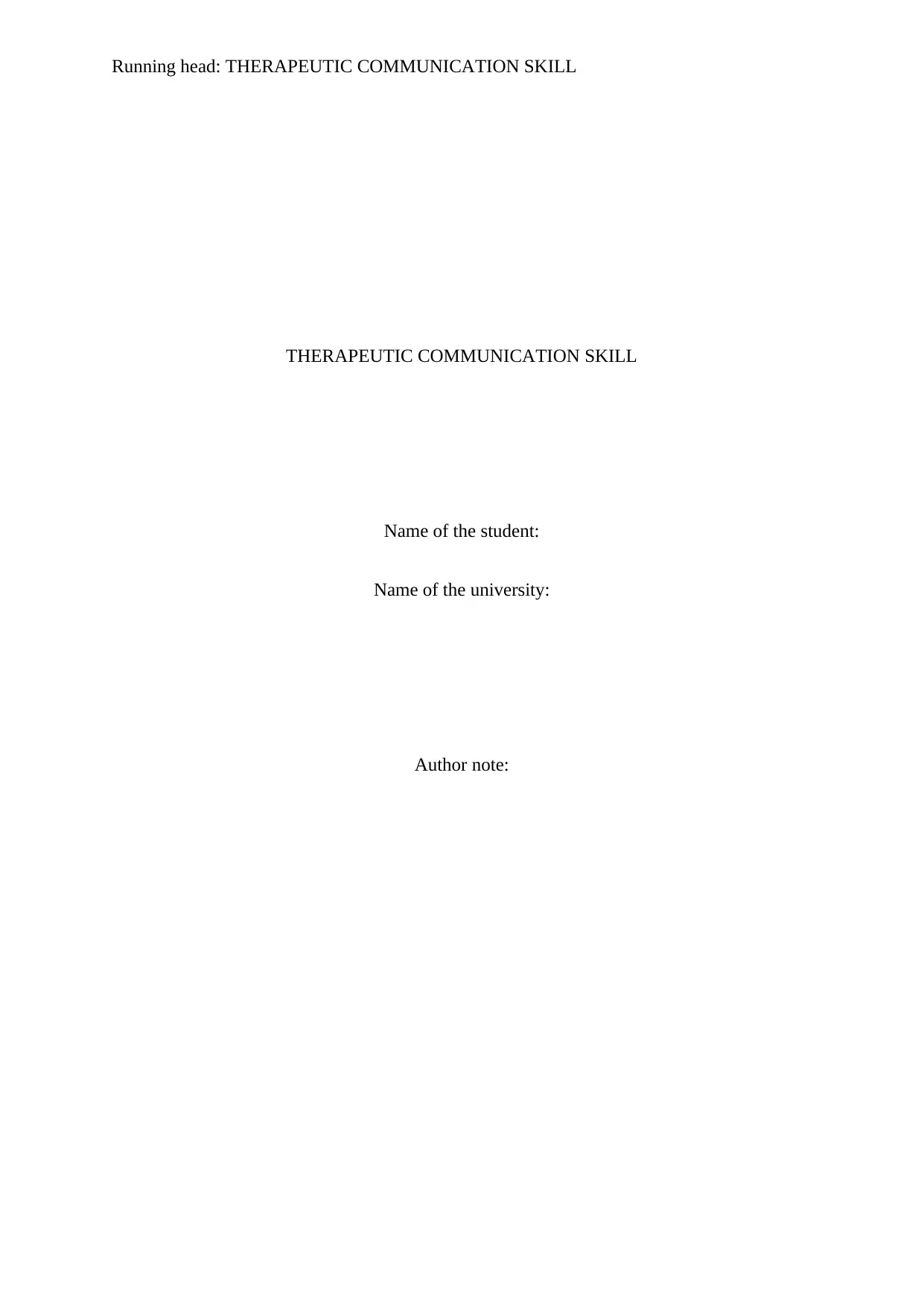
Running head: THERAPEUTIC COMMUNICATION SKILL
THERAPEUTIC COMMUNICATION SKILL
Name of the student:
Name of the university:
Author note:
THERAPEUTIC COMMUNICATION SKILL
Name of the student:
Name of the university:
Author note:
Paraphrase This Document
Need a fresh take? Get an instant paraphrase of this document with our AI Paraphraser
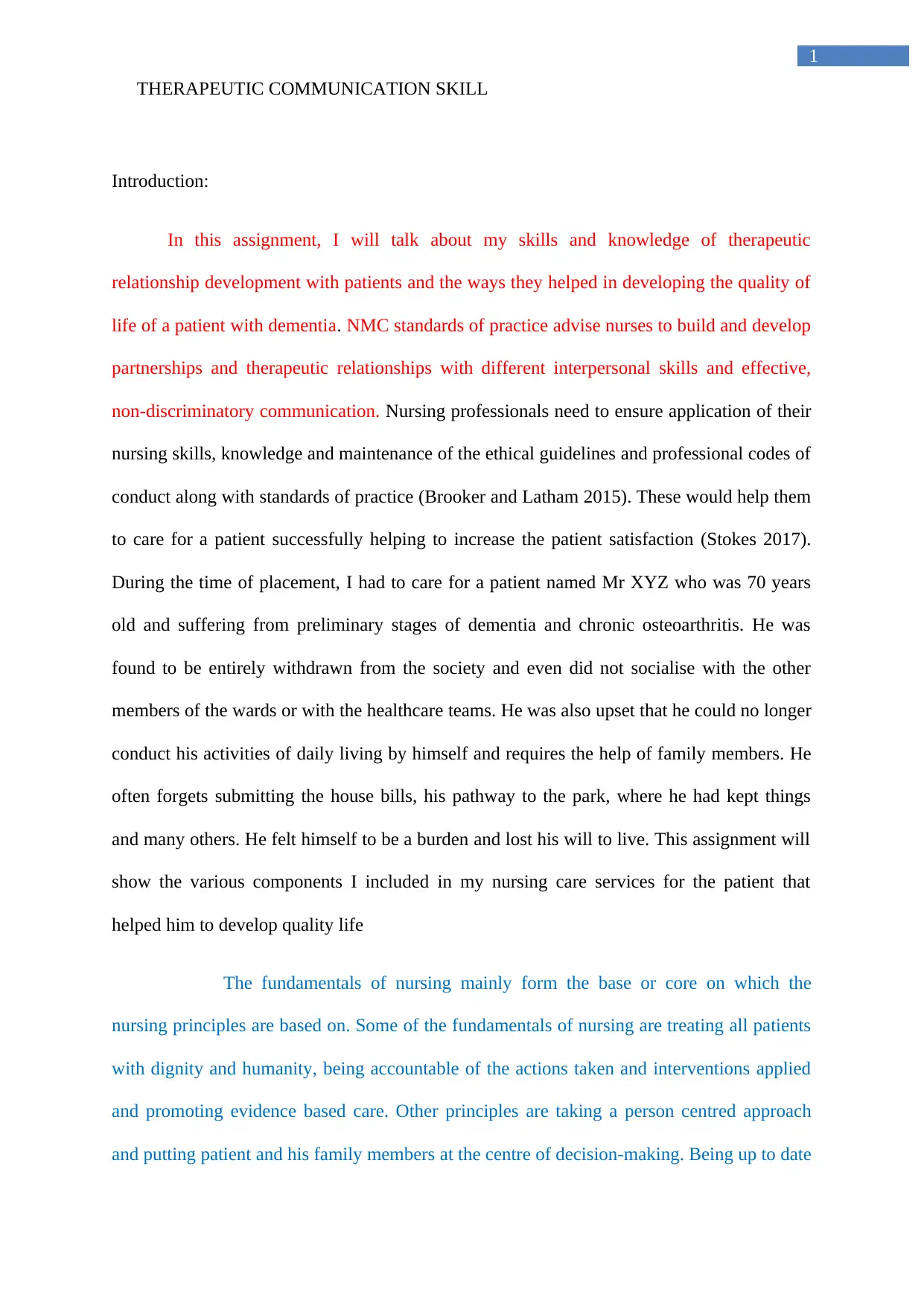
1
THERAPEUTIC COMMUNICATION SKILL
Introduction:
In this assignment, I will talk about my skills and knowledge of therapeutic
relationship development with patients and the ways they helped in developing the quality of
life of a patient with dementia. NMC standards of practice advise nurses to build and develop
partnerships and therapeutic relationships with different interpersonal skills and effective,
non-discriminatory communication. Nursing professionals need to ensure application of their
nursing skills, knowledge and maintenance of the ethical guidelines and professional codes of
conduct along with standards of practice (Brooker and Latham 2015). These would help them
to care for a patient successfully helping to increase the patient satisfaction (Stokes 2017).
During the time of placement, I had to care for a patient named Mr XYZ who was 70 years
old and suffering from preliminary stages of dementia and chronic osteoarthritis. He was
found to be entirely withdrawn from the society and even did not socialise with the other
members of the wards or with the healthcare teams. He was also upset that he could no longer
conduct his activities of daily living by himself and requires the help of family members. He
often forgets submitting the house bills, his pathway to the park, where he had kept things
and many others. He felt himself to be a burden and lost his will to live. This assignment will
show the various components I included in my nursing care services for the patient that
helped him to develop quality life
The fundamentals of nursing mainly form the base or core on which the
nursing principles are based on. Some of the fundamentals of nursing are treating all patients
with dignity and humanity, being accountable of the actions taken and interventions applied
and promoting evidence based care. Other principles are taking a person centred approach
and putting patient and his family members at the centre of decision-making. Being up to date
THERAPEUTIC COMMUNICATION SKILL
Introduction:
In this assignment, I will talk about my skills and knowledge of therapeutic
relationship development with patients and the ways they helped in developing the quality of
life of a patient with dementia. NMC standards of practice advise nurses to build and develop
partnerships and therapeutic relationships with different interpersonal skills and effective,
non-discriminatory communication. Nursing professionals need to ensure application of their
nursing skills, knowledge and maintenance of the ethical guidelines and professional codes of
conduct along with standards of practice (Brooker and Latham 2015). These would help them
to care for a patient successfully helping to increase the patient satisfaction (Stokes 2017).
During the time of placement, I had to care for a patient named Mr XYZ who was 70 years
old and suffering from preliminary stages of dementia and chronic osteoarthritis. He was
found to be entirely withdrawn from the society and even did not socialise with the other
members of the wards or with the healthcare teams. He was also upset that he could no longer
conduct his activities of daily living by himself and requires the help of family members. He
often forgets submitting the house bills, his pathway to the park, where he had kept things
and many others. He felt himself to be a burden and lost his will to live. This assignment will
show the various components I included in my nursing care services for the patient that
helped him to develop quality life
The fundamentals of nursing mainly form the base or core on which the
nursing principles are based on. Some of the fundamentals of nursing are treating all patients
with dignity and humanity, being accountable of the actions taken and interventions applied
and promoting evidence based care. Other principles are taking a person centred approach
and putting patient and his family members at the centre of decision-making. Being up to date
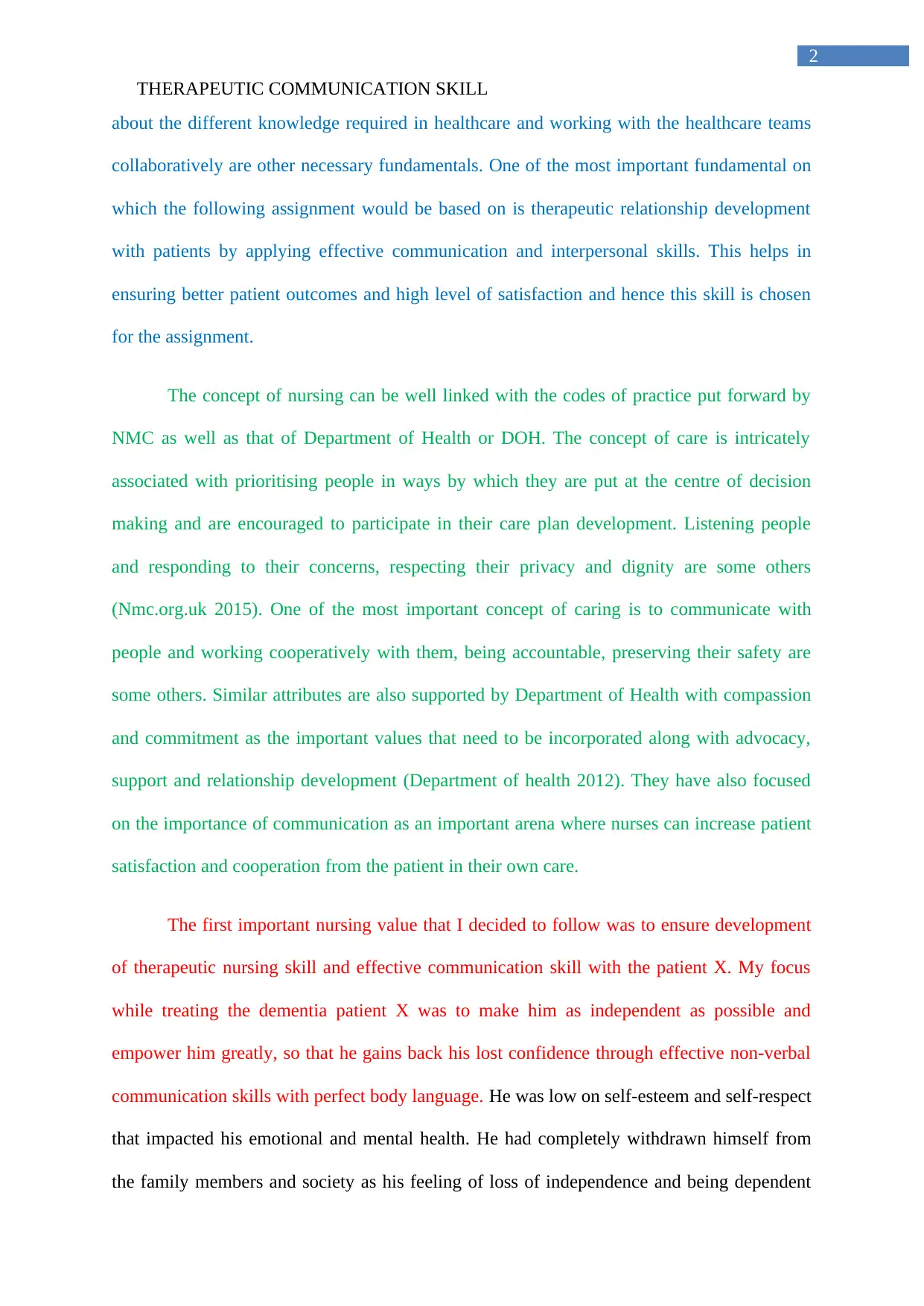
2
THERAPEUTIC COMMUNICATION SKILL
about the different knowledge required in healthcare and working with the healthcare teams
collaboratively are other necessary fundamentals. One of the most important fundamental on
which the following assignment would be based on is therapeutic relationship development
with patients by applying effective communication and interpersonal skills. This helps in
ensuring better patient outcomes and high level of satisfaction and hence this skill is chosen
for the assignment.
The concept of nursing can be well linked with the codes of practice put forward by
NMC as well as that of Department of Health or DOH. The concept of care is intricately
associated with prioritising people in ways by which they are put at the centre of decision
making and are encouraged to participate in their care plan development. Listening people
and responding to their concerns, respecting their privacy and dignity are some others
(Nmc.org.uk 2015). One of the most important concept of caring is to communicate with
people and working cooperatively with them, being accountable, preserving their safety are
some others. Similar attributes are also supported by Department of Health with compassion
and commitment as the important values that need to be incorporated along with advocacy,
support and relationship development (Department of health 2012). They have also focused
on the importance of communication as an important arena where nurses can increase patient
satisfaction and cooperation from the patient in their own care.
The first important nursing value that I decided to follow was to ensure development
of therapeutic nursing skill and effective communication skill with the patient X. My focus
while treating the dementia patient X was to make him as independent as possible and
empower him greatly, so that he gains back his lost confidence through effective non-verbal
communication skills with perfect body language. He was low on self-esteem and self-respect
that impacted his emotional and mental health. He had completely withdrawn himself from
the family members and society as his feeling of loss of independence and being dependent
THERAPEUTIC COMMUNICATION SKILL
about the different knowledge required in healthcare and working with the healthcare teams
collaboratively are other necessary fundamentals. One of the most important fundamental on
which the following assignment would be based on is therapeutic relationship development
with patients by applying effective communication and interpersonal skills. This helps in
ensuring better patient outcomes and high level of satisfaction and hence this skill is chosen
for the assignment.
The concept of nursing can be well linked with the codes of practice put forward by
NMC as well as that of Department of Health or DOH. The concept of care is intricately
associated with prioritising people in ways by which they are put at the centre of decision
making and are encouraged to participate in their care plan development. Listening people
and responding to their concerns, respecting their privacy and dignity are some others
(Nmc.org.uk 2015). One of the most important concept of caring is to communicate with
people and working cooperatively with them, being accountable, preserving their safety are
some others. Similar attributes are also supported by Department of Health with compassion
and commitment as the important values that need to be incorporated along with advocacy,
support and relationship development (Department of health 2012). They have also focused
on the importance of communication as an important arena where nurses can increase patient
satisfaction and cooperation from the patient in their own care.
The first important nursing value that I decided to follow was to ensure development
of therapeutic nursing skill and effective communication skill with the patient X. My focus
while treating the dementia patient X was to make him as independent as possible and
empower him greatly, so that he gains back his lost confidence through effective non-verbal
communication skills with perfect body language. He was low on self-esteem and self-respect
that impacted his emotional and mental health. He had completely withdrawn himself from
the family members and society as his feeling of loss of independence and being dependent
⊘ This is a preview!⊘
Do you want full access?
Subscribe today to unlock all pages.

Trusted by 1+ million students worldwide

3
THERAPEUTIC COMMUNICATION SKILL
on caregivers had affected him deeply. Therefore, I wanted to develop his quality of life to
ensure that he overcomes his depression and anxiety and be happy.
The nursing component that I focused on while providing person centred care for the
X was therapeutic relationship. Studies are of the opinion that development of therapeutic
nurse client relationship is associated with increased confidence of the patient on their own
abilities and thereby leads to patient satisfaction (Barbosa et al. 2015)). Patients also shown
high acceptance of the treatment interventions applied on them and their alignment and
adherence to the treatment procedures result in higher outcome on the patient (Roen et al.
2018). Therefore, I applied five important nursing components that helped in development of
therapeutic relationship with X through effective communication so that patient satisfaction
increases and he respond to the treatment without remaining withdrawn.
The first component that I integrated (while communicating with Mr. X and providing
care services to him) was trust. Studies have found that trust is a critical in nurse-client
communication and relationship development as clients remain in a vulnerable position
(Jonasson et al. 2017). Initially, trust in such relationships is quite fragile and therefore it
becomes important for a nurse in keeping promises to the client. When trust is breached, the
establishment of a relationship becomes difficult. Some of the steps by which I tried to
develop trust in the nurse-patient relationship while communicating with Mr. X are to
respectfully call him with his name, listening to the patient actively, offering constant follow-
ups about his health and meeting his needs. Other studies stated that remaining calm and
friendly, keeping requests and meeting needs of the patient, offering appropriate greetings
and closings are extremely important (Kim and Park 2017). While caring for Mr. Smith, I
maintained all the actions in a dedicating manner so that effective therapeutic relationship
develops with the patient.
THERAPEUTIC COMMUNICATION SKILL
on caregivers had affected him deeply. Therefore, I wanted to develop his quality of life to
ensure that he overcomes his depression and anxiety and be happy.
The nursing component that I focused on while providing person centred care for the
X was therapeutic relationship. Studies are of the opinion that development of therapeutic
nurse client relationship is associated with increased confidence of the patient on their own
abilities and thereby leads to patient satisfaction (Barbosa et al. 2015)). Patients also shown
high acceptance of the treatment interventions applied on them and their alignment and
adherence to the treatment procedures result in higher outcome on the patient (Roen et al.
2018). Therefore, I applied five important nursing components that helped in development of
therapeutic relationship with X through effective communication so that patient satisfaction
increases and he respond to the treatment without remaining withdrawn.
The first component that I integrated (while communicating with Mr. X and providing
care services to him) was trust. Studies have found that trust is a critical in nurse-client
communication and relationship development as clients remain in a vulnerable position
(Jonasson et al. 2017). Initially, trust in such relationships is quite fragile and therefore it
becomes important for a nurse in keeping promises to the client. When trust is breached, the
establishment of a relationship becomes difficult. Some of the steps by which I tried to
develop trust in the nurse-patient relationship while communicating with Mr. X are to
respectfully call him with his name, listening to the patient actively, offering constant follow-
ups about his health and meeting his needs. Other studies stated that remaining calm and
friendly, keeping requests and meeting needs of the patient, offering appropriate greetings
and closings are extremely important (Kim and Park 2017). While caring for Mr. Smith, I
maintained all the actions in a dedicating manner so that effective therapeutic relationship
develops with the patient.
Paraphrase This Document
Need a fresh take? Get an instant paraphrase of this document with our AI Paraphraser
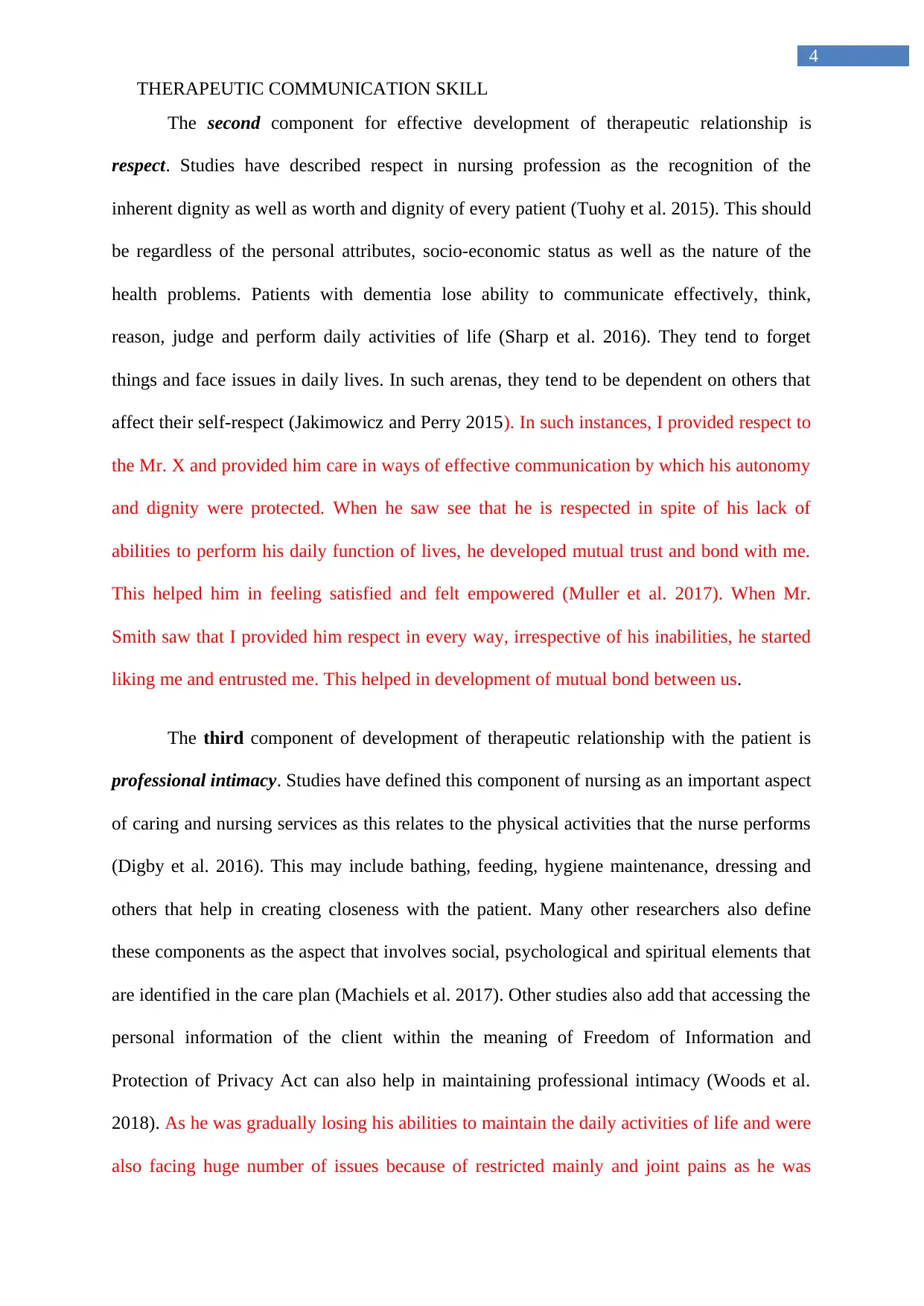
4
THERAPEUTIC COMMUNICATION SKILL
The second component for effective development of therapeutic relationship is
respect. Studies have described respect in nursing profession as the recognition of the
inherent dignity as well as worth and dignity of every patient (Tuohy et al. 2015). This should
be regardless of the personal attributes, socio-economic status as well as the nature of the
health problems. Patients with dementia lose ability to communicate effectively, think,
reason, judge and perform daily activities of life (Sharp et al. 2016). They tend to forget
things and face issues in daily lives. In such arenas, they tend to be dependent on others that
affect their self-respect (Jakimowicz and Perry 2015). In such instances, I provided respect to
the Mr. X and provided him care in ways of effective communication by which his autonomy
and dignity were protected. When he saw see that he is respected in spite of his lack of
abilities to perform his daily function of lives, he developed mutual trust and bond with me.
This helped him in feeling satisfied and felt empowered (Muller et al. 2017). When Mr.
Smith saw that I provided him respect in every way, irrespective of his inabilities, he started
liking me and entrusted me. This helped in development of mutual bond between us.
The third component of development of therapeutic relationship with the patient is
professional intimacy. Studies have defined this component of nursing as an important aspect
of caring and nursing services as this relates to the physical activities that the nurse performs
(Digby et al. 2016). This may include bathing, feeding, hygiene maintenance, dressing and
others that help in creating closeness with the patient. Many other researchers also define
these components as the aspect that involves social, psychological and spiritual elements that
are identified in the care plan (Machiels et al. 2017). Other studies also add that accessing the
personal information of the client within the meaning of Freedom of Information and
Protection of Privacy Act can also help in maintaining professional intimacy (Woods et al.
2018). As he was gradually losing his abilities to maintain the daily activities of life and were
also facing huge number of issues because of restricted mainly and joint pains as he was
THERAPEUTIC COMMUNICATION SKILL
The second component for effective development of therapeutic relationship is
respect. Studies have described respect in nursing profession as the recognition of the
inherent dignity as well as worth and dignity of every patient (Tuohy et al. 2015). This should
be regardless of the personal attributes, socio-economic status as well as the nature of the
health problems. Patients with dementia lose ability to communicate effectively, think,
reason, judge and perform daily activities of life (Sharp et al. 2016). They tend to forget
things and face issues in daily lives. In such arenas, they tend to be dependent on others that
affect their self-respect (Jakimowicz and Perry 2015). In such instances, I provided respect to
the Mr. X and provided him care in ways of effective communication by which his autonomy
and dignity were protected. When he saw see that he is respected in spite of his lack of
abilities to perform his daily function of lives, he developed mutual trust and bond with me.
This helped him in feeling satisfied and felt empowered (Muller et al. 2017). When Mr.
Smith saw that I provided him respect in every way, irrespective of his inabilities, he started
liking me and entrusted me. This helped in development of mutual bond between us.
The third component of development of therapeutic relationship with the patient is
professional intimacy. Studies have defined this component of nursing as an important aspect
of caring and nursing services as this relates to the physical activities that the nurse performs
(Digby et al. 2016). This may include bathing, feeding, hygiene maintenance, dressing and
others that help in creating closeness with the patient. Many other researchers also define
these components as the aspect that involves social, psychological and spiritual elements that
are identified in the care plan (Machiels et al. 2017). Other studies also add that accessing the
personal information of the client within the meaning of Freedom of Information and
Protection of Privacy Act can also help in maintaining professional intimacy (Woods et al.
2018). As he was gradually losing his abilities to maintain the daily activities of life and were
also facing huge number of issues because of restricted mainly and joint pains as he was
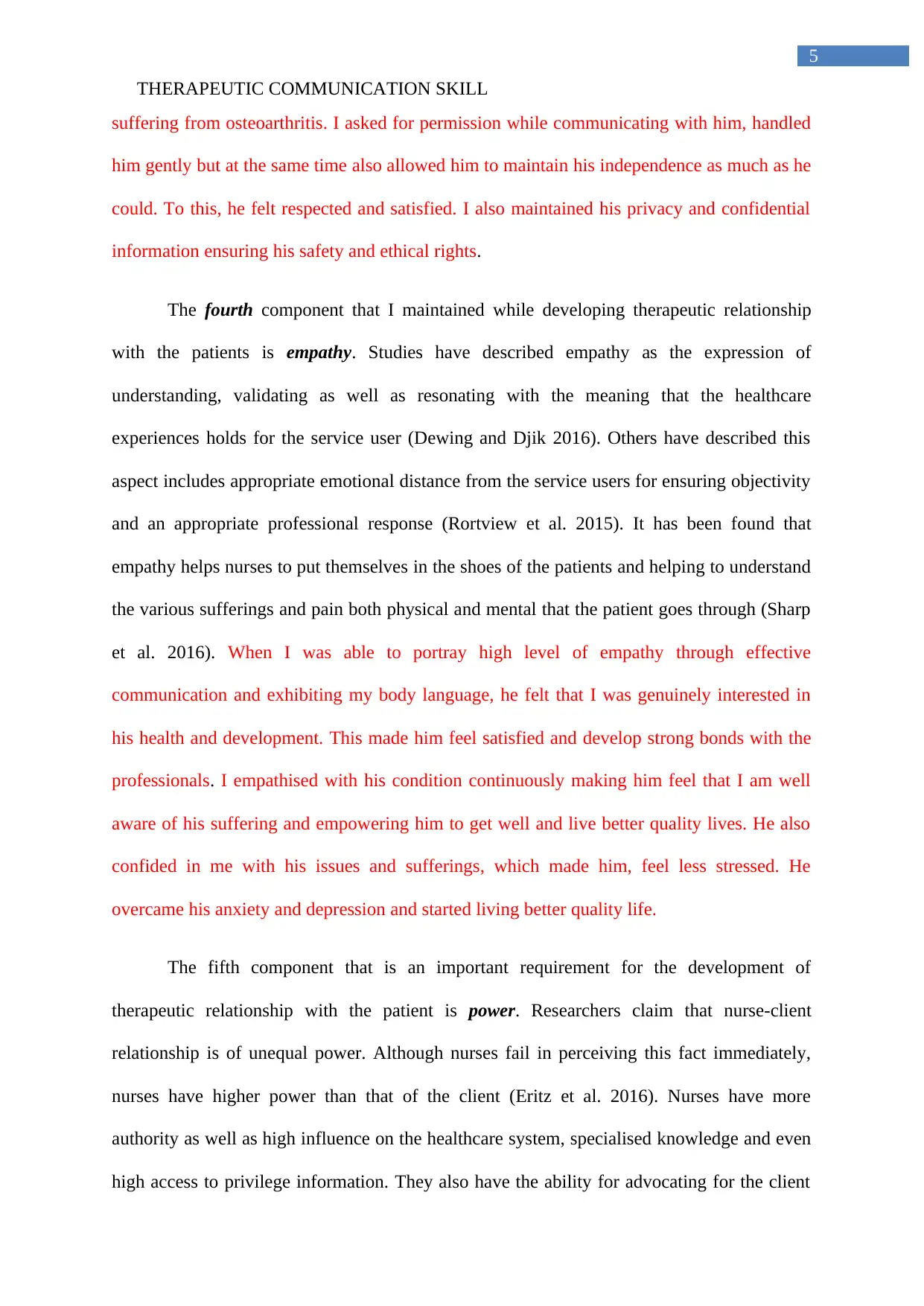
5
THERAPEUTIC COMMUNICATION SKILL
suffering from osteoarthritis. I asked for permission while communicating with him, handled
him gently but at the same time also allowed him to maintain his independence as much as he
could. To this, he felt respected and satisfied. I also maintained his privacy and confidential
information ensuring his safety and ethical rights.
The fourth component that I maintained while developing therapeutic relationship
with the patients is empathy. Studies have described empathy as the expression of
understanding, validating as well as resonating with the meaning that the healthcare
experiences holds for the service user (Dewing and Djik 2016). Others have described this
aspect includes appropriate emotional distance from the service users for ensuring objectivity
and an appropriate professional response (Rortview et al. 2015). It has been found that
empathy helps nurses to put themselves in the shoes of the patients and helping to understand
the various sufferings and pain both physical and mental that the patient goes through (Sharp
et al. 2016). When I was able to portray high level of empathy through effective
communication and exhibiting my body language, he felt that I was genuinely interested in
his health and development. This made him feel satisfied and develop strong bonds with the
professionals. I empathised with his condition continuously making him feel that I am well
aware of his suffering and empowering him to get well and live better quality lives. He also
confided in me with his issues and sufferings, which made him, feel less stressed. He
overcame his anxiety and depression and started living better quality life.
The fifth component that is an important requirement for the development of
therapeutic relationship with the patient is power. Researchers claim that nurse-client
relationship is of unequal power. Although nurses fail in perceiving this fact immediately,
nurses have higher power than that of the client (Eritz et al. 2016). Nurses have more
authority as well as high influence on the healthcare system, specialised knowledge and even
high access to privilege information. They also have the ability for advocating for the client
THERAPEUTIC COMMUNICATION SKILL
suffering from osteoarthritis. I asked for permission while communicating with him, handled
him gently but at the same time also allowed him to maintain his independence as much as he
could. To this, he felt respected and satisfied. I also maintained his privacy and confidential
information ensuring his safety and ethical rights.
The fourth component that I maintained while developing therapeutic relationship
with the patients is empathy. Studies have described empathy as the expression of
understanding, validating as well as resonating with the meaning that the healthcare
experiences holds for the service user (Dewing and Djik 2016). Others have described this
aspect includes appropriate emotional distance from the service users for ensuring objectivity
and an appropriate professional response (Rortview et al. 2015). It has been found that
empathy helps nurses to put themselves in the shoes of the patients and helping to understand
the various sufferings and pain both physical and mental that the patient goes through (Sharp
et al. 2016). When I was able to portray high level of empathy through effective
communication and exhibiting my body language, he felt that I was genuinely interested in
his health and development. This made him feel satisfied and develop strong bonds with the
professionals. I empathised with his condition continuously making him feel that I am well
aware of his suffering and empowering him to get well and live better quality lives. He also
confided in me with his issues and sufferings, which made him, feel less stressed. He
overcame his anxiety and depression and started living better quality life.
The fifth component that is an important requirement for the development of
therapeutic relationship with the patient is power. Researchers claim that nurse-client
relationship is of unequal power. Although nurses fail in perceiving this fact immediately,
nurses have higher power than that of the client (Eritz et al. 2016). Nurses have more
authority as well as high influence on the healthcare system, specialised knowledge and even
high access to privilege information. They also have the ability for advocating for the client
⊘ This is a preview!⊘
Do you want full access?
Subscribe today to unlock all pages.

Trusted by 1+ million students worldwide
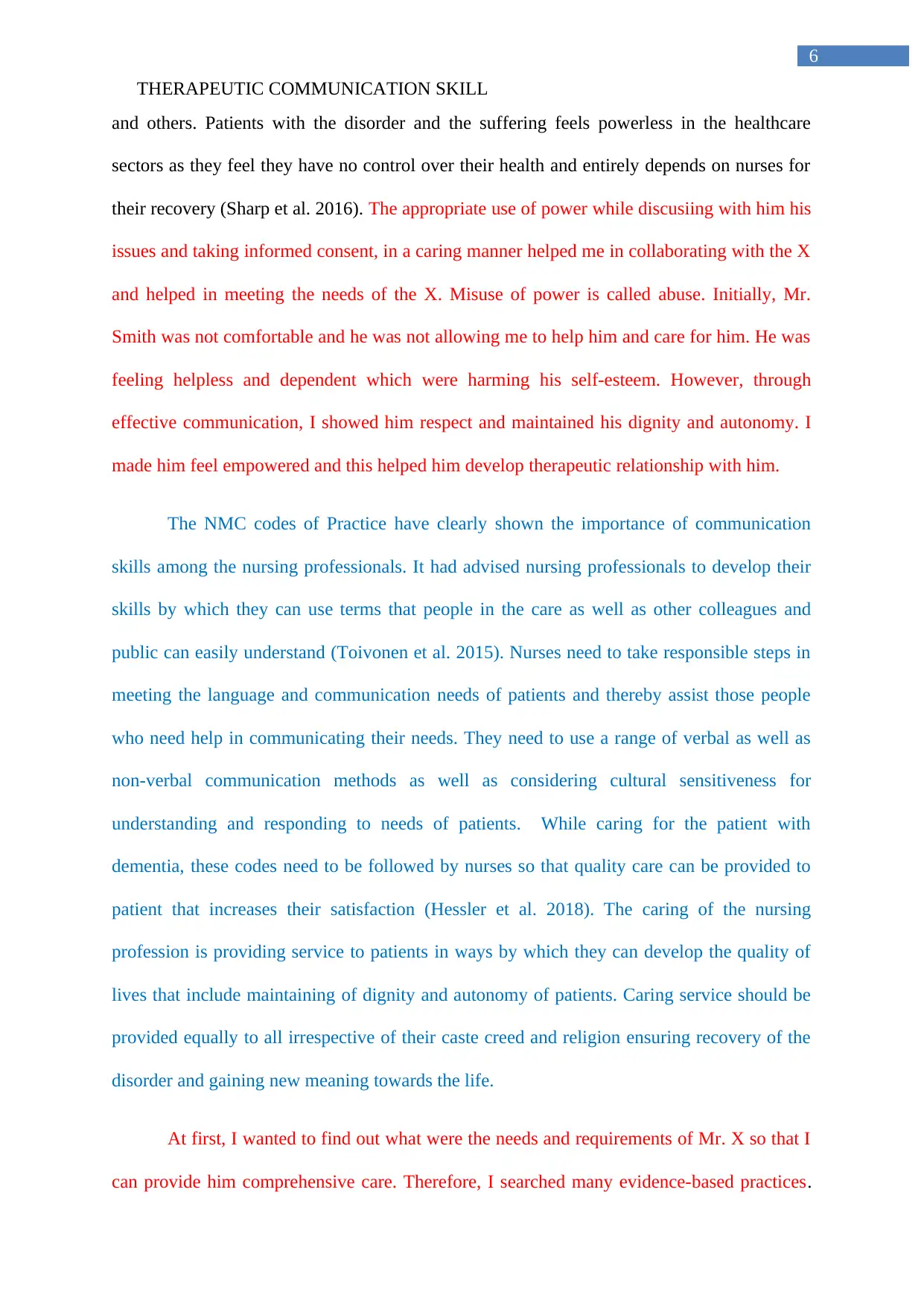
6
THERAPEUTIC COMMUNICATION SKILL
and others. Patients with the disorder and the suffering feels powerless in the healthcare
sectors as they feel they have no control over their health and entirely depends on nurses for
their recovery (Sharp et al. 2016). The appropriate use of power while discusiing with him his
issues and taking informed consent, in a caring manner helped me in collaborating with the X
and helped in meeting the needs of the X. Misuse of power is called abuse. Initially, Mr.
Smith was not comfortable and he was not allowing me to help him and care for him. He was
feeling helpless and dependent which were harming his self-esteem. However, through
effective communication, I showed him respect and maintained his dignity and autonomy. I
made him feel empowered and this helped him develop therapeutic relationship with him.
The NMC codes of Practice have clearly shown the importance of communication
skills among the nursing professionals. It had advised nursing professionals to develop their
skills by which they can use terms that people in the care as well as other colleagues and
public can easily understand (Toivonen et al. 2015). Nurses need to take responsible steps in
meeting the language and communication needs of patients and thereby assist those people
who need help in communicating their needs. They need to use a range of verbal as well as
non-verbal communication methods as well as considering cultural sensitiveness for
understanding and responding to needs of patients. While caring for the patient with
dementia, these codes need to be followed by nurses so that quality care can be provided to
patient that increases their satisfaction (Hessler et al. 2018). The caring of the nursing
profession is providing service to patients in ways by which they can develop the quality of
lives that include maintaining of dignity and autonomy of patients. Caring service should be
provided equally to all irrespective of their caste creed and religion ensuring recovery of the
disorder and gaining new meaning towards the life.
At first, I wanted to find out what were the needs and requirements of Mr. X so that I
can provide him comprehensive care. Therefore, I searched many evidence-based practices.
THERAPEUTIC COMMUNICATION SKILL
and others. Patients with the disorder and the suffering feels powerless in the healthcare
sectors as they feel they have no control over their health and entirely depends on nurses for
their recovery (Sharp et al. 2016). The appropriate use of power while discusiing with him his
issues and taking informed consent, in a caring manner helped me in collaborating with the X
and helped in meeting the needs of the X. Misuse of power is called abuse. Initially, Mr.
Smith was not comfortable and he was not allowing me to help him and care for him. He was
feeling helpless and dependent which were harming his self-esteem. However, through
effective communication, I showed him respect and maintained his dignity and autonomy. I
made him feel empowered and this helped him develop therapeutic relationship with him.
The NMC codes of Practice have clearly shown the importance of communication
skills among the nursing professionals. It had advised nursing professionals to develop their
skills by which they can use terms that people in the care as well as other colleagues and
public can easily understand (Toivonen et al. 2015). Nurses need to take responsible steps in
meeting the language and communication needs of patients and thereby assist those people
who need help in communicating their needs. They need to use a range of verbal as well as
non-verbal communication methods as well as considering cultural sensitiveness for
understanding and responding to needs of patients. While caring for the patient with
dementia, these codes need to be followed by nurses so that quality care can be provided to
patient that increases their satisfaction (Hessler et al. 2018). The caring of the nursing
profession is providing service to patients in ways by which they can develop the quality of
lives that include maintaining of dignity and autonomy of patients. Caring service should be
provided equally to all irrespective of their caste creed and religion ensuring recovery of the
disorder and gaining new meaning towards the life.
At first, I wanted to find out what were the needs and requirements of Mr. X so that I
can provide him comprehensive care. Therefore, I searched many evidence-based practices.
Paraphrase This Document
Need a fresh take? Get an instant paraphrase of this document with our AI Paraphraser
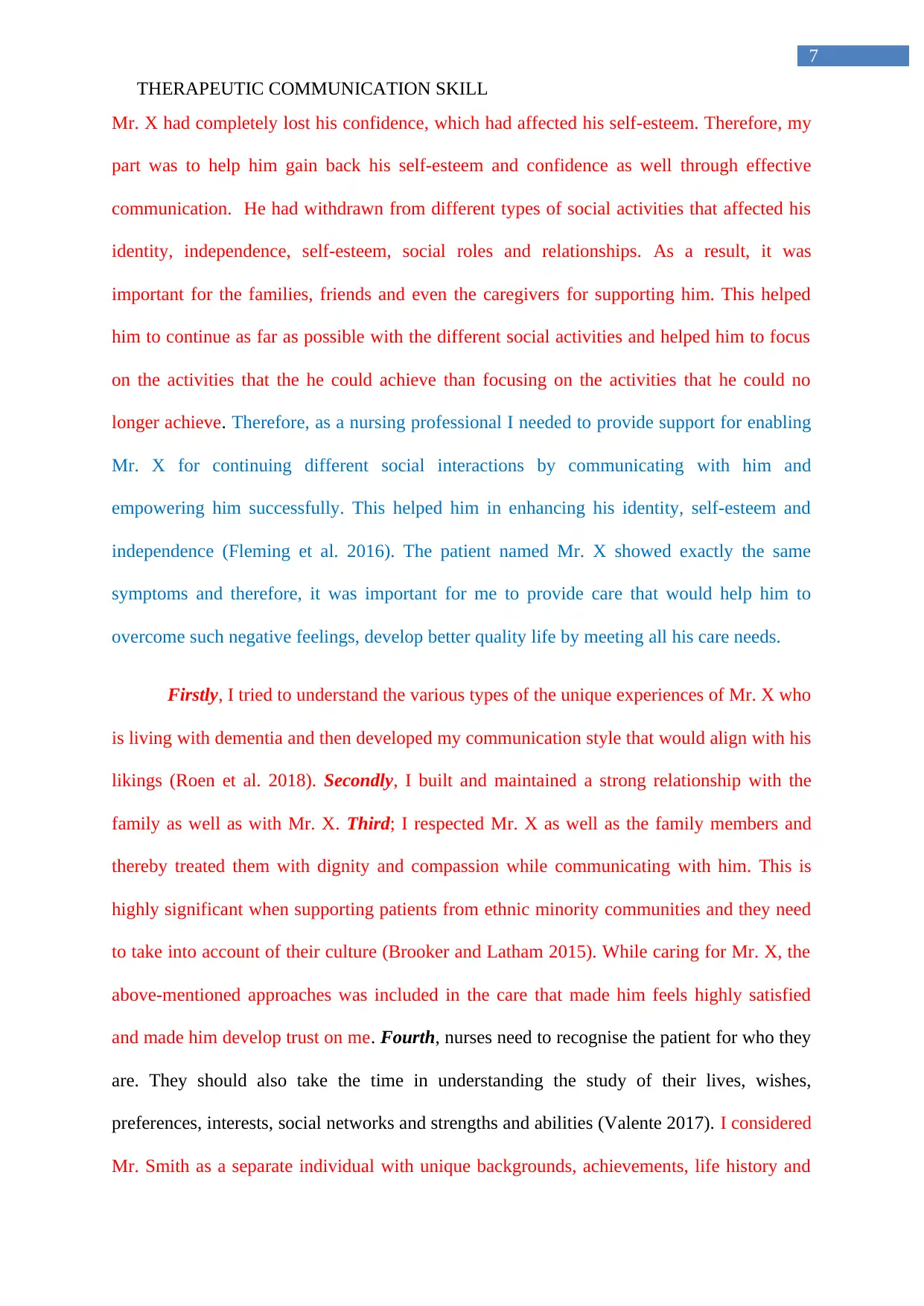
7
THERAPEUTIC COMMUNICATION SKILL
Mr. X had completely lost his confidence, which had affected his self-esteem. Therefore, my
part was to help him gain back his self-esteem and confidence as well through effective
communication. He had withdrawn from different types of social activities that affected his
identity, independence, self-esteem, social roles and relationships. As a result, it was
important for the families, friends and even the caregivers for supporting him. This helped
him to continue as far as possible with the different social activities and helped him to focus
on the activities that the he could achieve than focusing on the activities that he could no
longer achieve. Therefore, as a nursing professional I needed to provide support for enabling
Mr. X for continuing different social interactions by communicating with him and
empowering him successfully. This helped him in enhancing his identity, self-esteem and
independence (Fleming et al. 2016). The patient named Mr. X showed exactly the same
symptoms and therefore, it was important for me to provide care that would help him to
overcome such negative feelings, develop better quality life by meeting all his care needs.
Firstly, I tried to understand the various types of the unique experiences of Mr. X who
is living with dementia and then developed my communication style that would align with his
likings (Roen et al. 2018). Secondly, I built and maintained a strong relationship with the
family as well as with Mr. X. Third; I respected Mr. X as well as the family members and
thereby treated them with dignity and compassion while communicating with him. This is
highly significant when supporting patients from ethnic minority communities and they need
to take into account of their culture (Brooker and Latham 2015). While caring for Mr. X, the
above-mentioned approaches was included in the care that made him feels highly satisfied
and made him develop trust on me. Fourth, nurses need to recognise the patient for who they
are. They should also take the time in understanding the study of their lives, wishes,
preferences, interests, social networks and strengths and abilities (Valente 2017). I considered
Mr. Smith as a separate individual with unique backgrounds, achievements, life history and
THERAPEUTIC COMMUNICATION SKILL
Mr. X had completely lost his confidence, which had affected his self-esteem. Therefore, my
part was to help him gain back his self-esteem and confidence as well through effective
communication. He had withdrawn from different types of social activities that affected his
identity, independence, self-esteem, social roles and relationships. As a result, it was
important for the families, friends and even the caregivers for supporting him. This helped
him to continue as far as possible with the different social activities and helped him to focus
on the activities that the he could achieve than focusing on the activities that he could no
longer achieve. Therefore, as a nursing professional I needed to provide support for enabling
Mr. X for continuing different social interactions by communicating with him and
empowering him successfully. This helped him in enhancing his identity, self-esteem and
independence (Fleming et al. 2016). The patient named Mr. X showed exactly the same
symptoms and therefore, it was important for me to provide care that would help him to
overcome such negative feelings, develop better quality life by meeting all his care needs.
Firstly, I tried to understand the various types of the unique experiences of Mr. X who
is living with dementia and then developed my communication style that would align with his
likings (Roen et al. 2018). Secondly, I built and maintained a strong relationship with the
family as well as with Mr. X. Third; I respected Mr. X as well as the family members and
thereby treated them with dignity and compassion while communicating with him. This is
highly significant when supporting patients from ethnic minority communities and they need
to take into account of their culture (Brooker and Latham 2015). While caring for Mr. X, the
above-mentioned approaches was included in the care that made him feels highly satisfied
and made him develop trust on me. Fourth, nurses need to recognise the patient for who they
are. They should also take the time in understanding the study of their lives, wishes,
preferences, interests, social networks and strengths and abilities (Valente 2017). I considered
Mr. Smith as a separate individual with unique backgrounds, achievements, life history and

8
THERAPEUTIC COMMUNICATION SKILL
requirements and never made him generalised as another dementia patient. Fifth, nurses also
require developing a person centred outcomes with the patient as well as with the family
members that help in recognising and anticipating the phases of the condition (Valente 2017).
Sixth, nurses need to promote and thereby provide a dementia-friendly environment. I took
special initiatives to modify his room and immediate surroundings in ways by which the
patient was completely safe and reduced his chances of fall due to his restricted mobility.
While caring for Mr. X, I focused on routine socialisation through communication. It
is extremely important for combating the loneliness felt by the patient and for maintaining a
state of vitality (Roen et al. 2018). The nurses mainly perform the majority of the daily care
activities of the patient and therefore they need to assume the role to fulfil the omitted
sentiments of the attachment. Such patients just like Mr. X are seen to be fearful at their
cognitive impairment and believe that this might become apparent during the times of
socialisation (Brooker and Latham 2015). He felt that these might cause different social
activities to be unpleasant experience resulting in a dramatic decrease of his self-esteem. He
also believed that socialisation might require higher levels of his mental capacity than what
he believed to be capable of and it had resulted in development of insecurity within them
(Stokes 2017).
Nurses therefore need to fulfil the unique position within the inter-professional teams
and they need to provide around-the-clock care and thereby develop strong therapeutic
relationship with the patients through effective communication (Roen et al. 2018). While
caring for Mr. X, I used to make sure that I not only attend to all his need but also engage him
in his favourite activities to keep him occupied and enjoy his time in the ward and constantly
communicating with him. Strong therapeutic communications provide the opportunity in
regularly engaging in one-to-one interaction with the clients (Valente 2017). Simple
conversations during the time of ADLs was also found to be helpful by me in contributing to
THERAPEUTIC COMMUNICATION SKILL
requirements and never made him generalised as another dementia patient. Fifth, nurses also
require developing a person centred outcomes with the patient as well as with the family
members that help in recognising and anticipating the phases of the condition (Valente 2017).
Sixth, nurses need to promote and thereby provide a dementia-friendly environment. I took
special initiatives to modify his room and immediate surroundings in ways by which the
patient was completely safe and reduced his chances of fall due to his restricted mobility.
While caring for Mr. X, I focused on routine socialisation through communication. It
is extremely important for combating the loneliness felt by the patient and for maintaining a
state of vitality (Roen et al. 2018). The nurses mainly perform the majority of the daily care
activities of the patient and therefore they need to assume the role to fulfil the omitted
sentiments of the attachment. Such patients just like Mr. X are seen to be fearful at their
cognitive impairment and believe that this might become apparent during the times of
socialisation (Brooker and Latham 2015). He felt that these might cause different social
activities to be unpleasant experience resulting in a dramatic decrease of his self-esteem. He
also believed that socialisation might require higher levels of his mental capacity than what
he believed to be capable of and it had resulted in development of insecurity within them
(Stokes 2017).
Nurses therefore need to fulfil the unique position within the inter-professional teams
and they need to provide around-the-clock care and thereby develop strong therapeutic
relationship with the patients through effective communication (Roen et al. 2018). While
caring for Mr. X, I used to make sure that I not only attend to all his need but also engage him
in his favourite activities to keep him occupied and enjoy his time in the ward and constantly
communicating with him. Strong therapeutic communications provide the opportunity in
regularly engaging in one-to-one interaction with the clients (Valente 2017). Simple
conversations during the time of ADLs was also found to be helpful by me in contributing to
⊘ This is a preview!⊘
Do you want full access?
Subscribe today to unlock all pages.

Trusted by 1+ million students worldwide
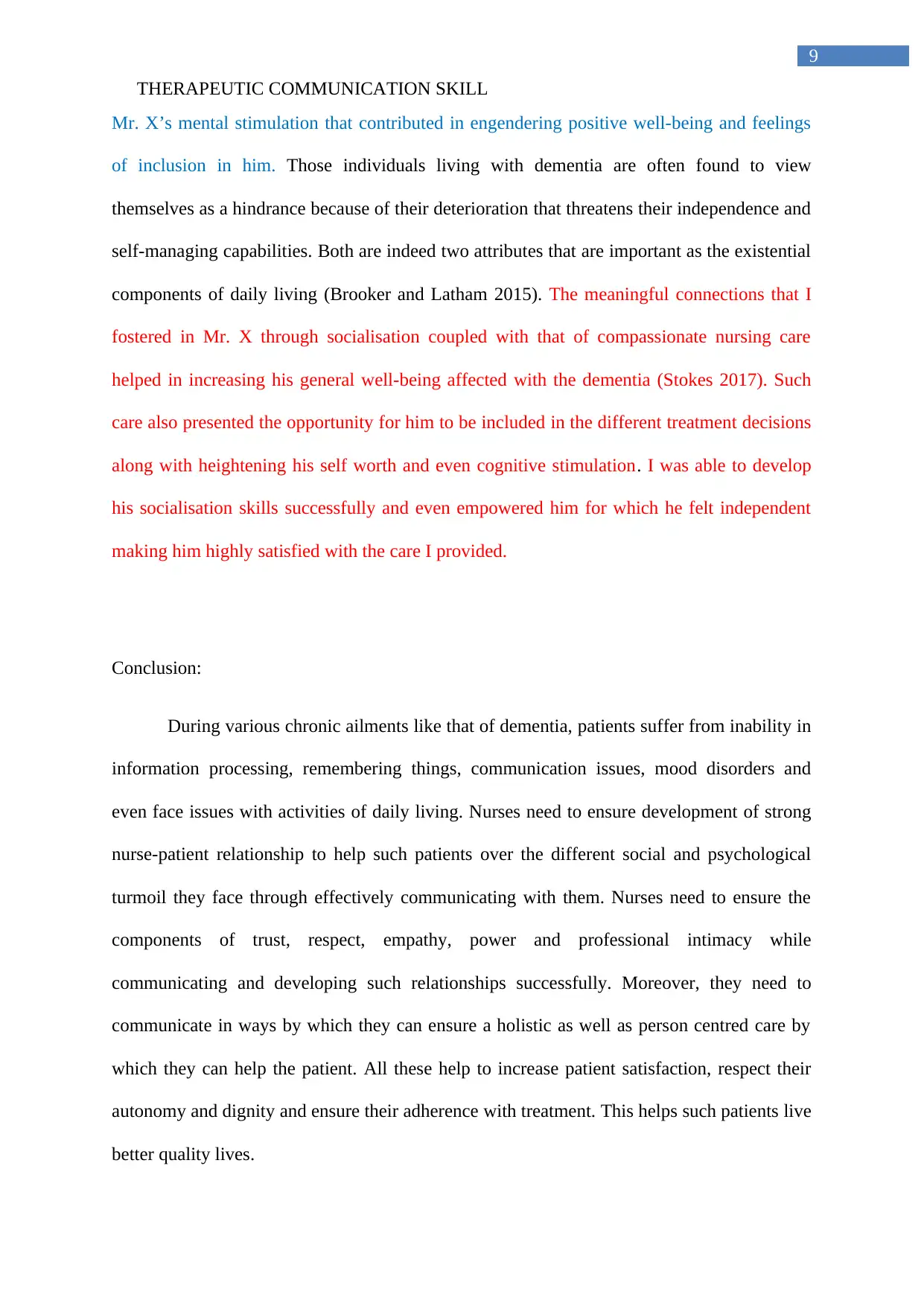
9
THERAPEUTIC COMMUNICATION SKILL
Mr. X’s mental stimulation that contributed in engendering positive well-being and feelings
of inclusion in him. Those individuals living with dementia are often found to view
themselves as a hindrance because of their deterioration that threatens their independence and
self-managing capabilities. Both are indeed two attributes that are important as the existential
components of daily living (Brooker and Latham 2015). The meaningful connections that I
fostered in Mr. X through socialisation coupled with that of compassionate nursing care
helped in increasing his general well-being affected with the dementia (Stokes 2017). Such
care also presented the opportunity for him to be included in the different treatment decisions
along with heightening his self worth and even cognitive stimulation. I was able to develop
his socialisation skills successfully and even empowered him for which he felt independent
making him highly satisfied with the care I provided.
Conclusion:
During various chronic ailments like that of dementia, patients suffer from inability in
information processing, remembering things, communication issues, mood disorders and
even face issues with activities of daily living. Nurses need to ensure development of strong
nurse-patient relationship to help such patients over the different social and psychological
turmoil they face through effectively communicating with them. Nurses need to ensure the
components of trust, respect, empathy, power and professional intimacy while
communicating and developing such relationships successfully. Moreover, they need to
communicate in ways by which they can ensure a holistic as well as person centred care by
which they can help the patient. All these help to increase patient satisfaction, respect their
autonomy and dignity and ensure their adherence with treatment. This helps such patients live
better quality lives.
THERAPEUTIC COMMUNICATION SKILL
Mr. X’s mental stimulation that contributed in engendering positive well-being and feelings
of inclusion in him. Those individuals living with dementia are often found to view
themselves as a hindrance because of their deterioration that threatens their independence and
self-managing capabilities. Both are indeed two attributes that are important as the existential
components of daily living (Brooker and Latham 2015). The meaningful connections that I
fostered in Mr. X through socialisation coupled with that of compassionate nursing care
helped in increasing his general well-being affected with the dementia (Stokes 2017). Such
care also presented the opportunity for him to be included in the different treatment decisions
along with heightening his self worth and even cognitive stimulation. I was able to develop
his socialisation skills successfully and even empowered him for which he felt independent
making him highly satisfied with the care I provided.
Conclusion:
During various chronic ailments like that of dementia, patients suffer from inability in
information processing, remembering things, communication issues, mood disorders and
even face issues with activities of daily living. Nurses need to ensure development of strong
nurse-patient relationship to help such patients over the different social and psychological
turmoil they face through effectively communicating with them. Nurses need to ensure the
components of trust, respect, empathy, power and professional intimacy while
communicating and developing such relationships successfully. Moreover, they need to
communicate in ways by which they can ensure a holistic as well as person centred care by
which they can help the patient. All these help to increase patient satisfaction, respect their
autonomy and dignity and ensure their adherence with treatment. This helps such patients live
better quality lives.
Paraphrase This Document
Need a fresh take? Get an instant paraphrase of this document with our AI Paraphraser

10
THERAPEUTIC COMMUNICATION SKILL
References:
Barbosa, A., Sousa, L., Nolan, M. and Figueiredo, D., 2015. Effects of person-centered care
approaches to dementia care on staff: a systematic review. American Journal of Alzheimer's
Disease & Other Dementias®, 30(8), pp.713-722.
Brooker, D. and Latham, I., 2015. Person-centred dementia care: Making services better with
the VIPS framework. Jessica Kingsley Publishers.
gov.uk 2012, The health and care system explained, Department of Health retrieved from:
https://www.gov.uk/government/publications/the-health-and-care-system-explained/the-
health-and-care-system-explained
Dewing, J. and Dijk, S., 2016. What is the current state of care for older people with
dementia in general hospitals? A literature review. Dementia, 15(1), pp.106-124.
Digby, R., Williams, A. and Lee, S., 2016. Nurse empathy and the care of people with
dementia. Australian Journal of Advanced Nursing, The, 34(1), p.52.
Eritz, H., Hadjistavropoulos, T., Williams, J., Kroeker, K., Martin, R.R., Lix, L.M. and
Hunter, P.V., 2016. A life history intervention for individuals with dementia: a randomised
controlled trial examining nursing staff empathy, perceived patient personhood and
aggressive behaviours. Ageing & Society, 36(10), pp.2061-2089.
Fang, X., Chen, J. and Ye, C., 2017. Prevention of dementia and care of dementia patients
from nursing perspective: best practices and development needs.
THERAPEUTIC COMMUNICATION SKILL
References:
Barbosa, A., Sousa, L., Nolan, M. and Figueiredo, D., 2015. Effects of person-centered care
approaches to dementia care on staff: a systematic review. American Journal of Alzheimer's
Disease & Other Dementias®, 30(8), pp.713-722.
Brooker, D. and Latham, I., 2015. Person-centred dementia care: Making services better with
the VIPS framework. Jessica Kingsley Publishers.
gov.uk 2012, The health and care system explained, Department of Health retrieved from:
https://www.gov.uk/government/publications/the-health-and-care-system-explained/the-
health-and-care-system-explained
Dewing, J. and Dijk, S., 2016. What is the current state of care for older people with
dementia in general hospitals? A literature review. Dementia, 15(1), pp.106-124.
Digby, R., Williams, A. and Lee, S., 2016. Nurse empathy and the care of people with
dementia. Australian Journal of Advanced Nursing, The, 34(1), p.52.
Eritz, H., Hadjistavropoulos, T., Williams, J., Kroeker, K., Martin, R.R., Lix, L.M. and
Hunter, P.V., 2016. A life history intervention for individuals with dementia: a randomised
controlled trial examining nursing staff empathy, perceived patient personhood and
aggressive behaviours. Ageing & Society, 36(10), pp.2061-2089.
Fang, X., Chen, J. and Ye, C., 2017. Prevention of dementia and care of dementia patients
from nursing perspective: best practices and development needs.

11
THERAPEUTIC COMMUNICATION SKILL
Fleming, R., Goodenough, B., Low, L.F., Chenoweth, L. and Brodaty, H., 2016. The
relationship between the quality of the built environment and the quality of life of people
with dementia in residential care. Dementia, 15(4), pp.663-680.
Hessler, J.B., Schäufele, M., Hendlmeier, I., Junge, M.N., Leonhardt, S., Weber, J. and
Bickel, H., 2018. Behavioural and psychological symptoms in general hospital patients with
dementia, distress for nursing staff and complications in care: results of the General Hospital
Study. Epidemiology and psychiatric sciences, 27(3), pp.278-287.
Jakimowicz, S. and Perry, L., 2015. A concept analysis of patient‐centred nursing in the
intensive care unit. Journal of advanced nursing, 71(7), pp.1499-1517.
Jonasson, L.L., Nyström, M. and Rydström, I., 2017. Reflective team in caring for people
living with dementia: a base for care improvement. Reflective Practice, 18(4), pp.435-447.
Kim, S.K. and Park, M., 2017. Effectiveness of person-centered care on people with
dementia: a systematic review and meta-analysis. Clinical interventions in aging, 12, p.381.
Machiels, M., Metzelthin, S.F., Hamers, J.P. and Zwakhalen, S.M., 2017. Interventions to
improve communication between people with dementia and nursing staff during daily nursing
care: a systematic review. International journal of nursing studies, 66, pp.37-46.
Müller, C., Lautenschläger, S., Meyer, G. and Stephan, A., 2017. Interventions to support
people with dementia and their caregivers during the transition from home care to nursing
home care: A systematic review. International journal of nursing studies, 71, pp.139-152.
Nmc.org.uk 2015 The Code Professional standards of practice and behaviour for nurses and
midwives, Nursing and Midwifery Council retrieved from:
https://www.nmc.org.uk/globalassets/sitedocuments/nmc-publications/nmc-old-code-
2015.pdf
THERAPEUTIC COMMUNICATION SKILL
Fleming, R., Goodenough, B., Low, L.F., Chenoweth, L. and Brodaty, H., 2016. The
relationship between the quality of the built environment and the quality of life of people
with dementia in residential care. Dementia, 15(4), pp.663-680.
Hessler, J.B., Schäufele, M., Hendlmeier, I., Junge, M.N., Leonhardt, S., Weber, J. and
Bickel, H., 2018. Behavioural and psychological symptoms in general hospital patients with
dementia, distress for nursing staff and complications in care: results of the General Hospital
Study. Epidemiology and psychiatric sciences, 27(3), pp.278-287.
Jakimowicz, S. and Perry, L., 2015. A concept analysis of patient‐centred nursing in the
intensive care unit. Journal of advanced nursing, 71(7), pp.1499-1517.
Jonasson, L.L., Nyström, M. and Rydström, I., 2017. Reflective team in caring for people
living with dementia: a base for care improvement. Reflective Practice, 18(4), pp.435-447.
Kim, S.K. and Park, M., 2017. Effectiveness of person-centered care on people with
dementia: a systematic review and meta-analysis. Clinical interventions in aging, 12, p.381.
Machiels, M., Metzelthin, S.F., Hamers, J.P. and Zwakhalen, S.M., 2017. Interventions to
improve communication between people with dementia and nursing staff during daily nursing
care: a systematic review. International journal of nursing studies, 66, pp.37-46.
Müller, C., Lautenschläger, S., Meyer, G. and Stephan, A., 2017. Interventions to support
people with dementia and their caregivers during the transition from home care to nursing
home care: A systematic review. International journal of nursing studies, 71, pp.139-152.
Nmc.org.uk 2015 The Code Professional standards of practice and behaviour for nurses and
midwives, Nursing and Midwifery Council retrieved from:
https://www.nmc.org.uk/globalassets/sitedocuments/nmc-publications/nmc-old-code-
2015.pdf
⊘ This is a preview!⊘
Do you want full access?
Subscribe today to unlock all pages.

Trusted by 1+ million students worldwide
1 out of 14
Related Documents
Your All-in-One AI-Powered Toolkit for Academic Success.
+13062052269
info@desklib.com
Available 24*7 on WhatsApp / Email
![[object Object]](/_next/static/media/star-bottom.7253800d.svg)
Unlock your academic potential
Copyright © 2020–2026 A2Z Services. All Rights Reserved. Developed and managed by ZUCOL.




